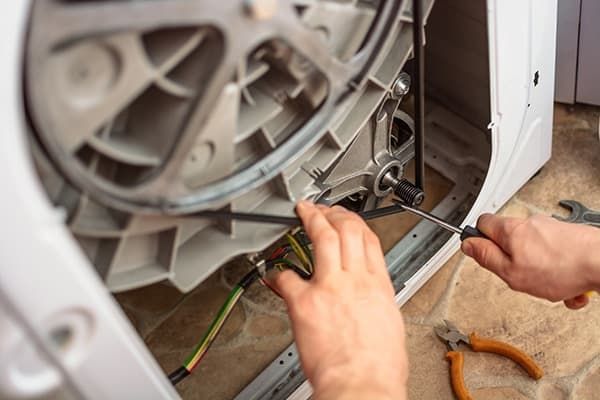GE Washer Loud on Spin Cycle? Find Out Why…
We expect to hear swishing and spinning sounds from our washing machine as we go about our day. But when a GE washer loud on spin cycle it can stop us in our tracks.
Typically, there’s a part malfunction responsible for when your washer makes loud noises. We’ll narrow down the noisemaker from a defective tub bearing to a failed motor coupling to lessen the laundry room racket.
The What, Where and Why For a GE Washer Loud on Spin Cycle
It can be time-consuming to wait for a repairman or tinker with your toolbox. Our list of faulty parts that can cause a GE washer loud on spin cycle focuses on the specifics you need to know.
But before we blame a broken part, we suggest a quick check of your laundry load. An unbalanced load is a common cause when your washing machine spin cycle very loud with thumping sounds. To fix an unbalanced load, redistribute laundry on either side of the washtub or balance heavy items with a few light ones.
Washer Is Overloaded or Unbalanced
Overloading your GE washing machine can lead to excessive noise and long-term damage to the appliance. When too many clothes are crammed into the drum, the motor strains to move the heavy load, causing unsettling vibrations and loud noises.
Over time, this undue stress can lead to premature wear and tear on crucial components such as the motor, bearings, and suspension system, ultimately shortening the lifespan of your washing machine.
Defective Tub Bearing
A faulty tub bearing is usually to blame when you hear your washer banging during the wash cycle. This small, ring-shaped part is located on a front-load washer’s outer tub and near the transmission on a top loader. Despite top load vs. front load washer differences, the tub bearing is a piece common to both models, keeping their inner tubs running smoothly.
Over time, water and detergent can seep from the tub’s seals and cause the bearing to rust and break. This is typically when you hear a loud banging or squealing sound during a spin cycle.
A defective tub bearing can’t be repaired and will need to be replaced. However, given its hard-to-reach location and proximity to other vital washer components, we recommend professional service for this job.
Damaged Drive Pulley
The drive pulley rotates your washer’s drive belt, which is what physically spins the washer drum. You can typically find the drive pulley on the back of the washer drum with the drive belt looped around it.
Sometimes the drive pulley can loosen over time, in which case tightening it should silence a GE washer loud on spin cycle. However, if the pulley is cracked or bent, it requires replacement.
Worn Drive Belt
A drive belt has the important job of actually spinning the washer drum. It can be found wrapped around the drum and suspended between the drive pulley and the tensioner pulley.
With repeated use, the drive belt can loosen, become worn with tears or cracks, or even break completely. This damage is what usually causes loud noises during a spin cycle.
Meanwhile, your washer won’t be able to spin at all if the drive belt is broken. While a loosened belt can be repositioned, a damaged belt should be replaced.

Failed Motor Coupling
A washer’s motor coupling connects the motor and transmission to help power the appliance. It’s located between the two mechanisms on direct-drive washers with no drive belt.
If the transmission malfunctions, the coupling will break to protect the motor from damage. Couplings can also wear out with time or become subject to breakage with repeated overloading of the washer tub. Once a motor coupling breaks, it cannot be repaired and will need to be replaced.
Reliable Appliance Service Parts & Service is here to help when you have a GE washer loud on the spin cycle. Call us today to silence the spinning or address any GE washer repair!

